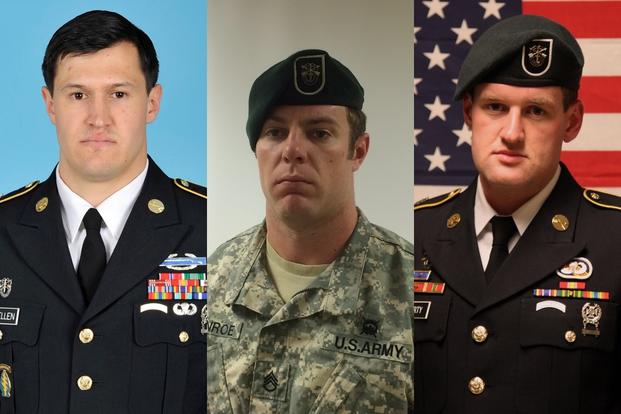The fathers of three Special Forces troops killed by a Jordanian First Sergeant in 2016 drew comparisons Friday between the incident and the alleged murder last month of Washington Post contributor Jamal Khashoggi by Saudi agents.
"I believe the Jordanians no more are going to come clean on the killing of our boys than Saudi Arabia is going to come clean on killing Khashoggi," said Jim Moriarty, father of Army Staff Sgt. James Moriarty.
The three fathers were at the National Press Club Friday for the announcement that a lawsuit was being filed federal district court for the District of Columbia, accusing the kingdom of Jordan "of complicity in the alleged terrorist incident and of attempting to cover it up."
The lawsuit sought damages against the Kingdom of Jordan and Jordanian Air Force First Sgt. Ma'Arek al-Tawayha, also known "Abu Tayeh," who opened fire on the three Americans with an M-16 rifle, for amounts "to be determined at trial."
"There's no amount of money that can take the place of my son, Jimmy," Jim Moriarty said.
The main reason for the lawsuit was that "we want to know if there is anything else out there, any clues, as to why that Jordanian soldier targeted our sons that day."
The federal complaint on behalf of the families charged that Jordanian officials were "hiding behind the defense that the Jordanian soldier who hunted down and brutally murdered their loved ones was acting within internationally accepted rules of engagement."
The three American staff sergeants were part of the Fifth Special Forces Group based at Fort Campbell, Kentucky, and were among about 2,000 U.S. troops assigned to Jordan in 2016.
Some of those troops worked with border artillery units, while others assisted the CIA-led training mission for rebels opposed to the regime of Syrian President Bashar al-Assad, according to the U.S. Army investigation.
Moriarty, a former Marine sergeant and helicopter door-gunner in Vietnam, said there were still unanswered questions that could come out in a trial: "Did those sorry bastards treat my son with the slightest bit of respect" after he was shot twice in the chest, "or did they just let him die?"
Moriarty's view was echoed by Chuck Lewellen and Brian McEnroe, the fathers of Staff Sgts. Matthew Lewellen and Kevin McEnroe. All three Gold Star fathers said that the alleged murder of Khashoggi and the killings of their sons were examples of betrayals and the shirking of responsibility by a close U.S. ally.
Khashoggi disappeared after entering the Saudi consulate in Istanbul on Oct 2. Five Saudis are now facing charges that could bring the death penalty.
Brian McEnroe charged that King Abdullah II, of Jordan, the closest U.S. ally in the Mideast after Israel, "has never apologized, not once, for the murder of our sons."
On Nov. 4, 2016, the three Americans were in a four-vehicle convoy attempting to enter the gate at the King Faisal Air Base, about 150 miles south of the capital, Amman. A previous group of U.S. vehicles had passed without incident.
None of the Americans was wearing body armor, according to the Army and the FBI.
When the second group of vehicles approached, a guard raised the gate and then Abu Tayeh opened fire, Brian McEnroe said. He said his son died almost instantly and Staff Sgt. Lewellen succumbed about two hours later.
Abu Tayeh then pursued Moriarty and another soldier, who took cover behind nearby cement barricades and returned fire with handguns, McEnroe said.
At one point, Moriarty raised his hands and shouted, in Arabic and English, "we're American, we're friends, don't shoot," but Abu Tayeh kept firing, Lewellen said he was told by the FBI.
Moriarty was mortally wounded before another U.S. soldier succeeded in wounding Abu Tayeh and subduing him, McEnroe said.
In all, the attack lasted about seven minutes, according to a video obtained by the FBI, and Abu Tayeh fired a total of 79 rounds, McEnroe said.
Jordanian officials initially called the incident a "tragic accident," and Jordanian media suggested that the Americans may have been drinking before they approached the gate.
The three fathers said autopsies showed not a trace of alcohol or drugs of any kind.
"Their memories were dragged through the mud," McEnroe said.
Chuck Lewellen said he and his wife attended the trial of Abu Tayeh in Jordan.
"That's one of the hardest things I've had to do, besides burying our young son," he said.
At the trial, Abu Tayeh said he had just been doing his job, Lewellen said.
"Well, if executing our boys was his job, then I guess he was doing his job," Lewellen said.
Lewellen said the trial showed that at least 11 other Jordanian soldiers or intelligence officers were in the vicinity of the gate when the shooting began.
"None of them did anything but hide," he said.
Jim Moriarty said Abu Tayeh was sentenced to life imprisonment, but he expected the Jordanian would be released in less than 15 years.
Jim Moriarty spoke of his last contact with his son in a phone call on the night before the incident.
"Hey buddy, how's it going?" he said he asked.
"Hey, Pops, been real busy," his son replied.
"It kills me that I'll never hear that again," Jim Moriarty said.
-- Richard Sisk can be reached at richard.sisk@military.com.













